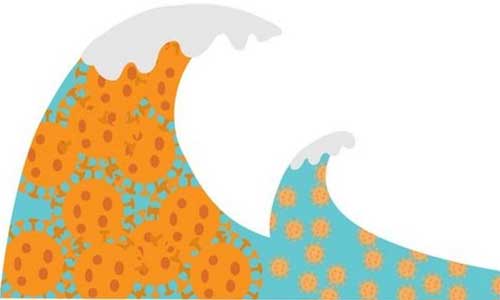According to the public health officials, Afghanistan might be on the eve of entering into the second of wave of covid-19 with nearing seasonal changes during fall and winter. Health officials concerns that during the winter, we will face three challenges: air pollution, seasonal flu, and the corona-virus. they say if these cases are combined, the vulnerability of the citizens will increase. Nevertheless,they informed of preparations to prevent from spread of the second wave of the corona-virus with providing diagnosing facilities and treatment services in provinces. Based on an earlier assessment, the Ministry of Public Health estimated that some 10 million Afghans were infected with the corona-virus in Afghanistan and out of which about eight thousand cases of this virus are still active in the country. The ministry of public health officials, as media reports quoted, stressed that the social gatherings such as Muharram ceremony should be held outdoors with maintaining all health advises and we must not repeat the mistakes of Eid al-Fitr during the Muharram mourning ceremony.
In simultaneity to public health alarms, a number of local health experts and viral specialists also alarmed that the country may see a new wave of corona-virus during the cold seasons while earlier it was negated due to the non-implementation of the quarantine plan in the country. Now, health experts believe that the corona-virus will get more active in cold environment and so the risks will double when it combined with closed doors and windows in the winter season. According to researches carried out in advanced countries, it is said that the levels of antibodies decline in two to three months after the first infection. for example, recently a research was carried out in UK saying that the levels of antibodies which destroy the virus peaked about three weeks after the onset of symptoms then swiftly declined. The study revealed that while 60% of people marshaled antibody response at the height of their battle with the virus, only 17% retained the same potency three months later. Antibody levels fell as much as 23-fold over the period. In some cases, it became undetectable. “People are producing a reasonable antibody response to the virus, but it is waning over a short period of time depending on how high the peak was, that determines how long the antibodies are staying around,” report quoted from Dr Katie Doores, a university professor in London.
Another study was released by King’s College in UK that the antibody levels rose higher and last longer in patients who had severe cases. The detail of this research was in a way that the university researchers have monitored antibody levels in patients and hospital workers for three months after symptoms emerged. The scientists drew on test results from 65 patients and six healthcare workers who tested positive for the virus, and a further 31 staff who volunteered to have regular antibody tests between March and June. The result of this research showed higher and last longer antibody in patients who had severe cases. Medically, it was justified in a way that the patients who had more virus, churn out more antibodies to fight the infection.
These studies have also implications for the development of a vaccine and for the pursuit of “herd immunity” in the community over time. The immune system has multiple ways to fight the corona-virus but if antibodies are the main line of defense, the findings suggested that people could become re-infected in seasonal waves and that vaccines may not protect them for long.“Infection tends to give ones the best-case scenario for an antibody response, so if infection is giving antibody that wane in two to three months, the vaccine will potentially do the same thing,” as report quoted said Doores. A similar report released by Oxford University indicating that the corona-virus vaccine produces lower levels of antibodies in macaques than are seen in humans infected with the virus. While the vaccine appeared to protect the animals from serious infection, they still became infected and may have been able to pass on the virus. Therefore, the scientists express “no certainty” in any of the vaccines in development would work, and said it is still unclear what kind of immune response is needed to prevent infection.
Despite these facts and scientific concerns, the people and citizens of Afghanistan are reckless about the corona-virus and do not follow the health recommendations during daily businesses and especially during Muharram ceremony. Based on personal observations, a large number of mourners mourn without masks and without maintaining social distances and thus, do not follow any of the health recommendations. Although it is not possible to isolate all people at homes because of poverty crisis, it is possible to enforce health regulations and instructions such as using masques, maintaining social distance, washing hands and so on. If the current recklessness continue until next cold months, there might be dreadful crisis in the country. The scientific reports shows that warm weather reduced corona-virus spread by 20% while the cooler and drier weather helps the virus linger on surfaces longer. Moreover, the virus spreads much better in inside closed spaces while out in the open environment it is easily swept away with a breeze or is damaged by the sun.
Home » Opinion » Health Officials Alert: Afghanistan on the Brink of Second Wave of Covid-19
Health Officials Alert: Afghanistan on the Brink of Second Wave of Covid-19
| Mohammad Zahir Akbari

